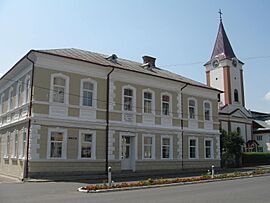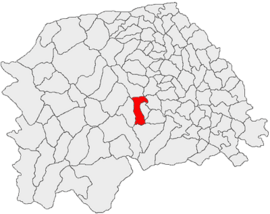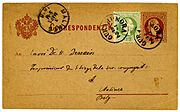Gura Humorului facts for kids
Quick facts for kids
Gura Humorului
|
||
|---|---|---|

View from Gura Humorului's town center (August 2010)
|
||
|
||

Location in Suceava County
|
||
| Country | ||
| County | Suceava | |
| Area | 60.90 km2 (23.51 sq mi) | |
| Elevation | 470 m (1,540 ft) | |
| Population
(2011)
|
Lua error in Module:Wd at line 1,575: attempt to index field 'wikibase' (a nil value). | |
| Time zone | EET/EEST (UTC+2/+3) | |
| Postal code |
725300
|
|
| Area code | (+40) 02 30 | |
Gura Humorului is a town in northeastern Romania. It's located in Suceava County, a part of the historical region called Bukovina. The town's name comes from the Moldova River and Humor River, which meet here.
Gura Humorului is the seventh largest town in Suceava County. In 2021, about 13,278 people lived there. It officially became a town in 1904. Later, in 2005, it was recognized as a resort town. The famous Voroneț Monastery is located in Voroneț, which is now a neighborhood of Gura Humorului.
Contents
Where is Gura Humorului?
Gura Humorului is in the northeastern part of Romania. It sits in a valley where the Moldova River and Humor River meet. This area is at the edge of the Obcinele Bucovinei Mountains. The town is about 470 meters (1,540 feet) above sea level.
Important roads and railways pass through the town. The European route E58 goes through Gura Humorului. There is also a railway connecting Suceava to Vatra Dornei. Suceava, the main city of the county, is about 34 kilometers (21 miles) away.
Who Lives in Gura Humorului?
Long ago, in 1775, the area of Bukovina had only about 60,000 people. To help the region grow, authorities encouraged people to move there. Many different groups came, including Germans, Rusyns, Hungarians, Ukrainians, Poles, Romanians, and Jews. By 1910, the population had grown to over 800,000 people.
Here's how the population of Gura Humorului has changed over time:
- 1910: 5,308 people
- 1930: 6,042 people
- 1948: 4,573 people
- 1956: 7,216 people
- 1966: 9,081 people
- 1977: 13,235 people
- 1992: 16,629 people
- 2002: 15,656 people
- 2011: 13,667 people
- 2021: 13,278 people
According to the 2011 census, most people in Gura Humorului are ethnic Romanians (about 97%). Other groups include Roma, Germans, Poles, Ukrainians, Hungarians, and Russians.
Gura Humorului is the seventh most populated town in Suceava County. It is the second largest town that has the official status of a "town" (after Vicovu de Sus).
History of the Town
From 1774 to 1918, Gura Humorului was part of the Habsburg monarchy (which was a big empire in Central Europe). During World War I, the area became a battleground. After the war, in 1919, Bukovina became part of Romania.
Jewish Community in Gura Humorului
Jewish people started settling in Gura Humorului around 1835. They joined other groups already living there, like Germans from Bohemia. The Jewish community grew, and by 1869, they made up about a third of the town's population. They also built a place for study and prayer called a Beth midrash.
A big fire in 1899 destroyed many homes and businesses in the town. Jewish communities in America helped to rebuild it. The Jewish population continued to grow, reaching almost 2,000 people by 1927.
Jewish culture thrived in the years between the two World Wars. People spoke Yiddish, German, and Romanian. Many Jewish young people studied their religious texts (the Torah) along with school subjects like geography and math. The community had its own social and political groups that were active in public life.
During World War II, the Jewish community in Gura Humorului faced great hardship. Under the leadership of Ion Antonescu, Jewish people were forced to leave their homes. Most of them were sent to a place called Transnistria in 1941. Many did not survive this difficult journey and the conditions there.
After the war, most of the Jewish people who survived moved to Israel between 1947 and 1951. Only a few hundred remained in Gura Humorului at that time.
Twin Towns – Sister Cities
Gura Humorului has friendly connections with these towns:
Famous People from Gura Humorului
Some notable people were born or lived in Gura Humorului:
- Andreea Boghian - a rower
- Nathan Juran - an American film director
- Olha Kobylianska - a Ukrainian-German writer
- Viorel Lucaci - a rugby player
- Mihai Macovei - a rugby player
- Rixi Markus - a bridge player
- Vlad Nistor - a rugby player
- Daniel Plai - a rugby player
- Victor Săhleanu - a doctor and anthropologist
- Dorin Semeghin - a footballer
- Cătălin Țăranu - a professional Go player
- Salomon Wininger - a biographer
Gallery
See also
 In Spanish: Gura Humorului para niños
In Spanish: Gura Humorului para niños
 | Toni Morrison |
 | Barack Obama |
 | Martin Luther King Jr. |
 | Ralph Bunche |
















